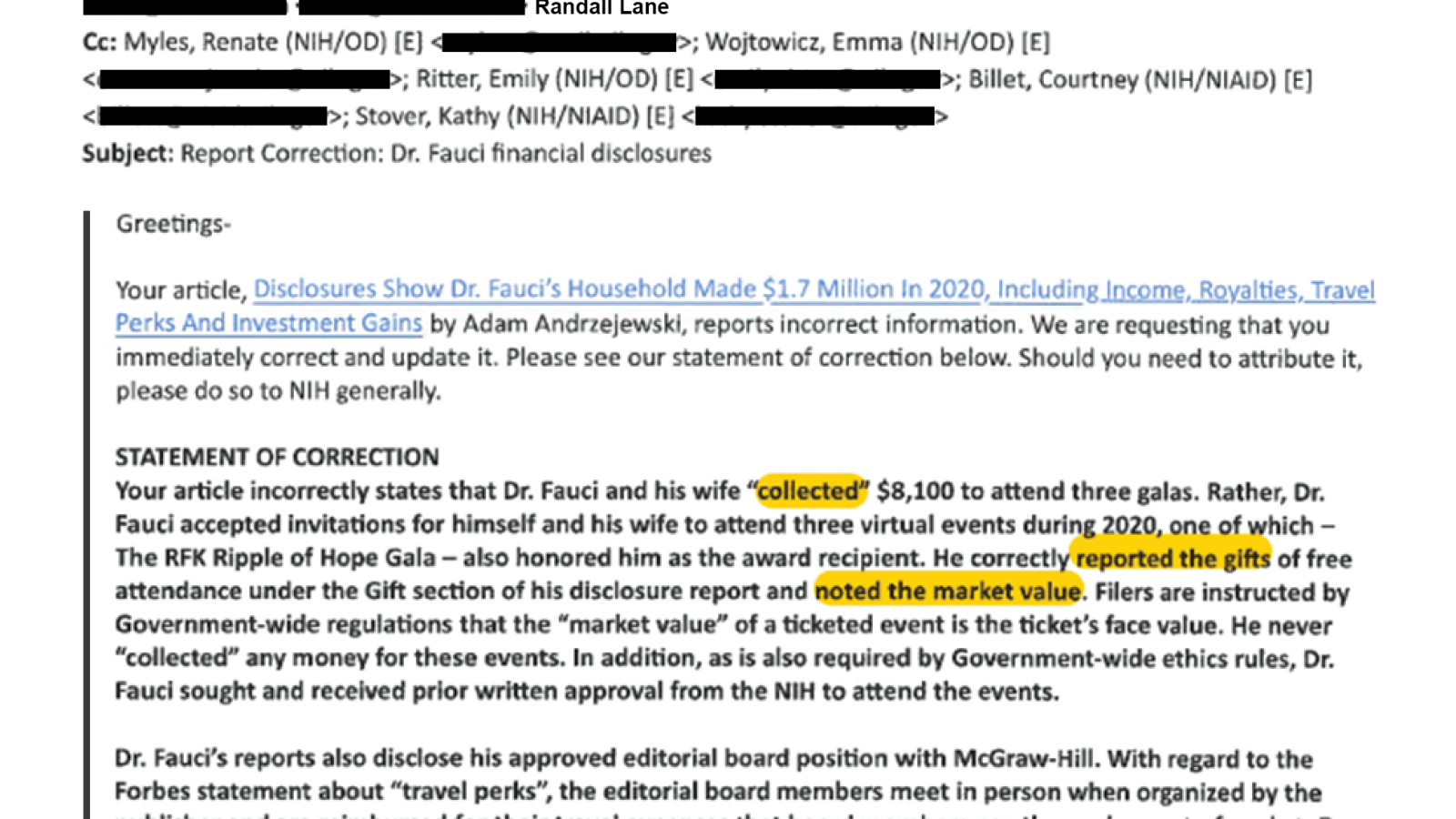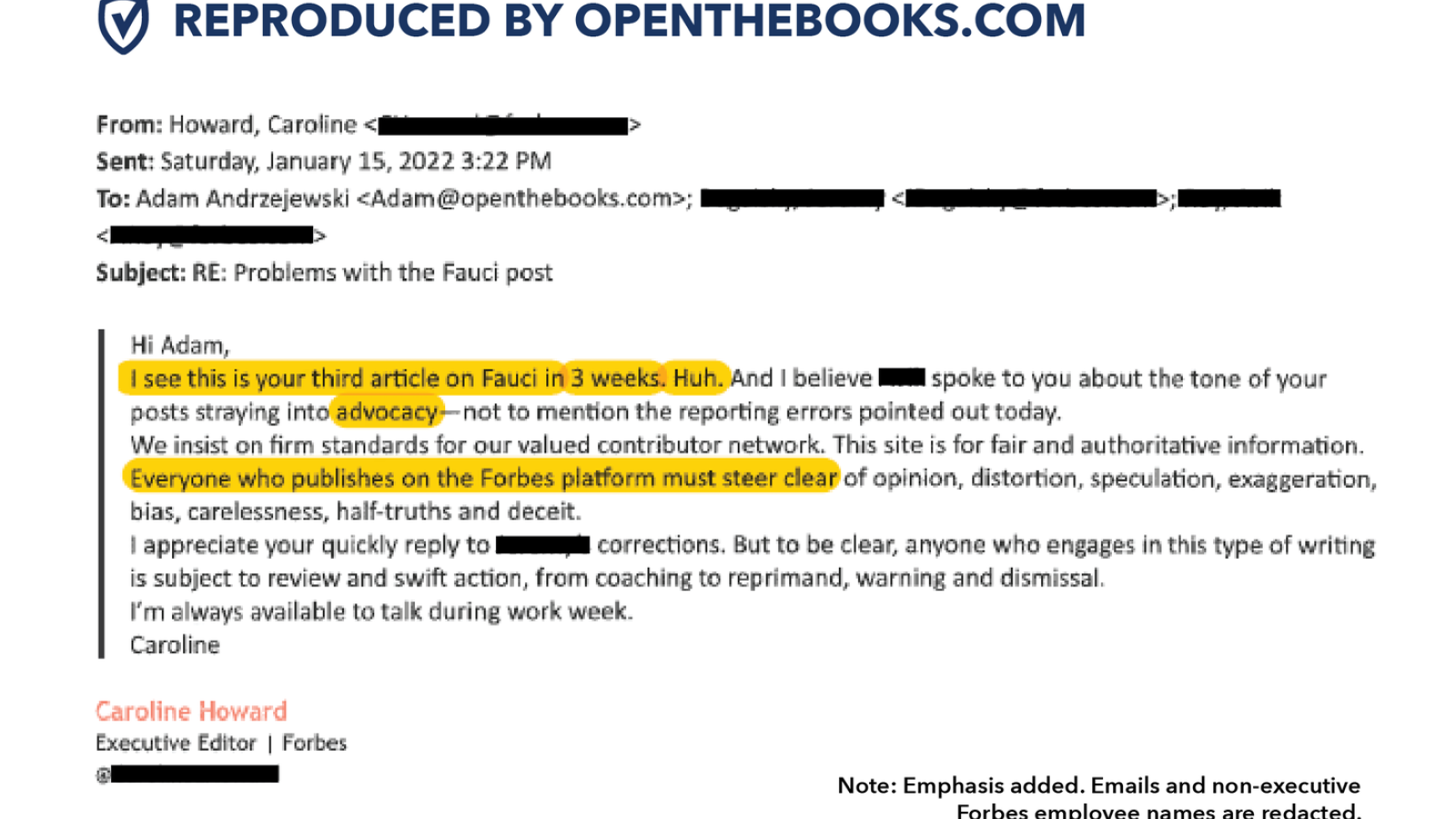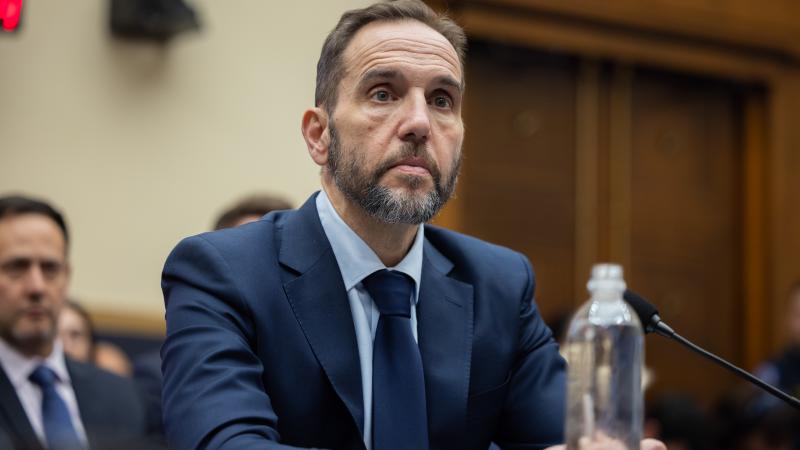Revealed: NIH email leading to Forbes' ouster of Fauci critic
Following NIH demand for "correction" to report on Fauci financials, business publisher dumped one of its favorite contributors, the CEO of government spending watchdog Open the Books.
National Institutes of Health (NIH) officials demanded a "correction" in a Forbes article on Dr. Anthony Fauci, director of the National Institute of Allergy and Infectious Diseases (NIAID), based on the technical difference between receiving payment and accepting gifts.
It's false to say the highest-paid federal employee "collected" $8,100 from attending three virtual galas, the officials said, referring to the phrasing in the original version of the Jan. 15 article on Fauci's $1.7 million in reported household income for 2020.
Fauci "correctly reported the gifts of free attendance" for himself and his wife and "noted the market value" on his disclosure form, according to a Jan. 16 email from six NIH public and government affairs officers to Forbes Chief Content Officer Randall Lane.
They also took issue with the phrase "travel perks" to describe the standard reimbursement Fauci receives as a McGraw-Hill editorial board member to travel to the publisher's meetings.
Forbes apparently used the feds' complaint as a second and final strike against the article's author, Adam Andrzejewski, who wrote about investigations by Open the Books, the government transparency watchdog he leads.
Less than 24 hours before the NIH email, Forbes Executive Editor Caroline Howard warned Andrzejewski that he was on thin ice for "reporting errors" in the Fauci article and "straying into advocacy" in articles about his investigations.
Those supposed errors, according to Andrzejewski: "a number that was right in the title and wrong in the text" that was quickly flagged by an editor, who also suggested language and style edits that Andrzejewski accepted.
Andrzejewski posted both emails Wednesday on Open the Books' new Substack newsletter. Less than 24 hours after NIH complained, "my regular Forbes editor called and announced new rules," he wrote: no more Fauci articles and "pre-approval for all future topics."
The collection of NIH officials who contacted Lane on a Sunday morning weren't looking to "correct the record about Fauci's travel reimbursements," he said: It was code to Forbes to "do something about" his reporting, and it worked.
The combative style of NIH news management on display in this episode evokes Fauci's involvement with then-NIH Director Francis Collins' plan to enlist their media allies to "take down" the trio of "fringe epidemiologists" who wrote the Great Barrington Declaration, which questioned much of the feds' COVID-19 response.

Forbes dumped Andrzejewski Jan. 28, nearly eight years after he started writing and four years after his promotion to "senior policy contributor."
It wasn't the business publisher's first editorial decision suggesting a propensity to filter news judgment through the medium of its ideological leanings.
In the waning days of the Trump administration, Lane had threatened to treat any business that hired a Trump press secretary as "a potential funnel of disinformation" in Forbes reporting. The publisher later inexplicably hid an article by a former Senate Democratic nominee that critically compared children's mask mandates to standardized testing.
Andrzejewski's purported flubs weren't enough for Forbes to remove his full archive or even the flagged article on Fauci's 2020 income, which he sees as the publisher's tacit admission that his reporting is well-grounded.
His final contribution was based in part on documents obtained by Sen. Roger Marshall (R-Kan.), whose interest was piqued by Andrzejewski's digging into Fauci's financials through Freedom of Information Act requests and a lawsuit against a resistant NIH.
Andrzejewski quickly got the feeling that Forbes didn't like his Fauci investigations. In 2020, the publisher chose 24 of Andrzejewski's 36 articles as "editors' picks," giving them prominent website placement. "They basically had my back" for seven years, he told Just the News.
He started 2021 with the first Fauci investigation, shortly after President Biden named the longtime NIAID director his chief medical adviser. Andrzejewski broke the news that Fauci's salary exceeded the president's.
Forbes withheld its editors' pick from every article Andrzejewski contributed last year and through January, 56 total, even though only six concerned Fauci. The longtime contributor "had kind of a little clue" that he was treading on dangerous territory, he said.
An hour after his final article went live Jan. 15, Andrzejewski heard from Howard, the executive editor. "I see this is your third article on Fauci in 3 weeks. Huh," she wrote.
Howard alluded to another editor who spoke to Andrzejewski about "the tone of your posts straying into advocacy" and the supposed errors from that day's article. Every contributor "must steer clear of opinion, distortion, speculation, exaggeration, bias, carelessness, half-truths and deceit."
If Andrzejewski didn't comply, he might be subject to coaching or even "reprimand, warning and dismissal," she said.

It's not clear what Howard means by "advocacy." Many contributors use the platform to promote their causes, including a public interest law firm whose Forbes archive is even bigger than Andrzejewski's.
In its Monday article, the Institute for Justice threatened to sue Onondaga County, N.Y., if it carries out its plan to forcibly remove homeowners under eminent domain.
Howard didn't answer queries regarding the alleged "reporting errors" in Andrzejewski's article and why his advocacy is treated differently from that of the Institute for Justice.
Forbes spokesperson Bill Hankes previously told Just the News that it doesn't discuss "individual personnel matters," but that the publisher "reports on the personal financial matters of prominent figures probably more than any other publication."
The NIH officials who sought a correction — Amanda Fine, Renate Myles, Emma Wojtowicz, Emily Ritter, Courtney Billet and Kathy Stover — didn't respond to queries.
The Facts Inside Our Reporter's Notebook
Links
- original version
- Fauci's $1.7 million in reported household income for 2020
- disclosure form
- Open the Books' new Substack newsletter
- full archive
- obtained by Sen. Roger Marshall (R-Kan.)
- editors' picks
- first Fauci investigation
- Forbes archive is even bigger
- Institute for Justice threatened to sue
Other Media
















